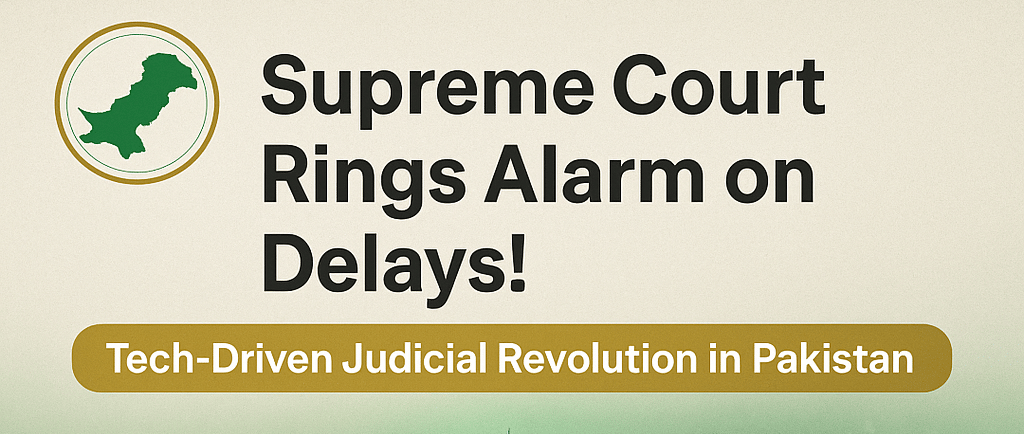Supreme Court of Pakistan Urges Judicial Reforms to End Delays
The Supreme Court calls for major judicial reforms, using technology and case management tools to reduce delays and ensure timely justice in Pakistan.
NATIONALBUSINESSTECHNOLOGY
8/16/20252 min read


Supreme Court Calls for Sweeping Reforms to End Judicial Delays
ISLAMABAD:
The Supreme Court of Pakistan has stressed the urgent need for transformative reforms in the judicial system, emphasizing that only through the use of technology, structural improvements, and disciplined case management can justice be delivered swiftly and effectively.
The remarks came in a four-page judgment authored by Justice Syed Mansoor Ali Shah, during proceedings on a case related to the auction of immovable property. The apex court highlighted that Pakistan’s judiciary must learn from global best practices and evolve into a system that is transparent, timely, and citizen-focused.
Long-Delayed Case Example
The case under review dates back to 2011, when an auction was first challenged. The petitioner’s objections were dismissed the same year, after which an appeal was filed in the high court. That appeal remained undecided for ten years until 2021. The matter then reached the Supreme Court in 2022 and is still under consideration in 2025—illustrating the depth of systemic delays.
Delays Are a Solvable Challenge
The judgment noted that courts around the world have proven that judicial delays are not inevitable, but rather the result of institutional shortcomings. Countries like Singapore, the UK, Brazil, Estonia, Canada, China, Denmark, and Australia have successfully reduced case backlogs by adopting digital filing systems, real-time dashboards, automated scheduling, and AI-assisted case management.
“These experiences show that courts can transform from passive custodians of files into active managers of justice delivery,” the judgment observed.
Economic and Social Consequences of Delays
Justice Shah cautioned that delays in adjudication carry heavy economic and societal costs. Prolonged litigation discourages investment, weakens contractual obligations, and erodes trust in the judiciary.
He emphasized: “The credibility of any justice system depends not only on the fairness of its decisions but also on their timeliness. Justice delayed makes remedies ineffective and rights meaningless.”
Constitutional Right to Speedy Justice
The ruling further clarified that timely justice is not only an administrative matter but a constitutional right under Articles 4, 9, and 10A of the Constitution of Pakistan. A delayed trial, it said, amounts to the denial of due process.
Scale of the Backlog
The court revealed that over 2.2 million cases are currently pending across Pakistan, including more than 55,900 cases before the Supreme Court alone, despite the appointment of additional judges.
“These figures are not mere statistics—they represent real disputes left unresolved, often at great personal and financial cost,” the judgment noted.
Call for a Modern Case Management System
The Supreme Court urged a transition toward a modern, responsive, and intelligent case management framework, which must ensure:
Early listing of cases on a fair basis
Elimination of queue-jumping and preferential scheduling
Priority handling of cases of constitutional, economic, and national significance
Age-tracking systems to identify dormant cases
Careful use of AI tools for scheduling support while safeguarding judicial independence
Warning Against Erosion of Public Trust
The judgment concluded with a warning that continued delays erode public confidence, undermine the rule of law, and hit the poor and vulnerable hardest, as they cannot bear the financial and emotional strain of long-drawn litigation.
Explore
Your lens into Pakistan's vibrant stories.
Connect
Discover
+92-300-0440097
© 2025. All rights reserved.
